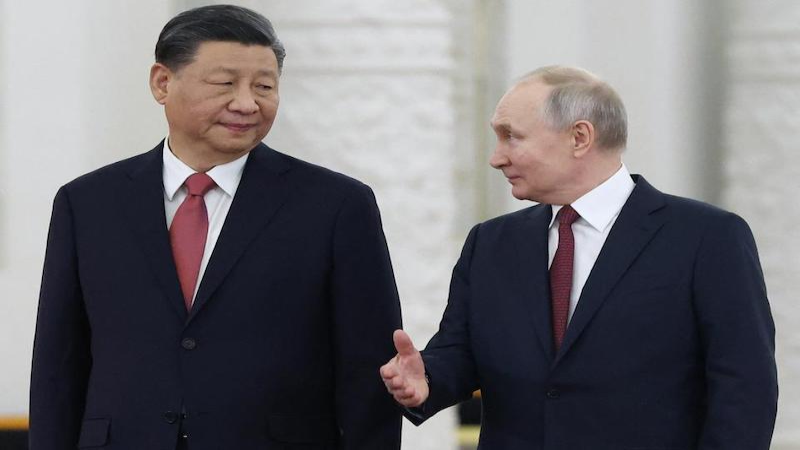
Russia’s Kowtowing To China: Energy And Beyond
By Ariel Cohen, Fletcher School alumnus, Senior Fellow at Atlantic Council
Russia’s invasion of Ukraine has left Moscow wanting for allies. While the “usual suspects” (Belarus, Eritrea, Nicaragua, North Korea, Venezuela, and a few others) have shown support, Russia has found itself diplomatically isolated. Even China, the supposed panacea to Western sanctions with whom Russia was supposed to have a “friendship without limits” has remained intentionally aloof.
With the energy-reliant Russian economy running out of options, it increasingly turned toward China. This is an acceleration of processes started by President Vladimir Putin decades ago. However, Russia needs China far more than China needs Russia.
On its one-year anniversary of invading Ukraine, Russian gas sales were halved compared to before the war. Russia hoped that Xi Jinping’s visit to Moscow would allow for some relief. Xi did deliver some flowery language, stating “Right now there are changes – the likes of which we haven’t seen for 100 years – and we are the ones driving these changes together” when describing relations with Russia. Xi also emphasized the importance of energy in an earlier open letter, writing that “China is ready to work with Russia to forge closer partnership in energy cooperation.”
However, China is clearly looking after its own interests, and taking its sweet time. No new agreement on gas has been signed yet. Vladimir Putin brought up plans for a gas pipeline from Siberia to China ahead of the meeting, claiming the agreement merely needed finalization. China has yet to respond. Time and time again Russia has sought meaningful support from China, and China has demurred.

China is the world’s largest energy consumer, granting it much leverage over Russia. Putin lost the massive European natural gas market, carefully tended by the Soviet and post-Soviet leaders, including himself. The revenue from the 150 billion cubic meters of gas sales was Russia’s lifeline. China is nowhere near replacing that income. Russia is only China’s fifth largest supplier of natural gas, with its impact on driving China’s economy is marginal. Russia only contributes to 6% of China’s gas imports, whereas the number one partner, Australia, accounts for 40%. Russia blundered when in September 2022 it attempted to coerce China when Gazprom turned off natural gas flows to China through its eastern Siberian pipeline for more than a week, claiming the pipeline needed maintenance.
Oil alone is no salvation for Russia either. Although Russia currently supplies a sixth of China’s oil imports, making it China’s top oil supplier, China has too many other sources of oil and relies on too diverse a fossil fuel portfolio for Russian coercion to be effective. Reserves in the South China Sea hold about 5 trillion cubic meters of natural gas and 16 to 33 billion barrels of oil. These domestic reserves combined with China’s diplomatic coup in negotiating Saudi – Iranian rapprochement ensure that China enjoys relations with massive alternative suppliers.

Gas exports are no panacea either. “Nearly all Russian gas pipelines are geared to Europe, and building new ones is costly, requires advanced technology, and takes time and money” stated Agathe Demarais, global forecasting director for Economist Intelligence. At a time when Russia needs alternative customers for its gas above all else, China is slow to assist. Natural gas requires time and upfront investment that China is not willing to extend to Russia.
Despite plans to reduce energy imports, China has increasedoil purchases from Russia. China doubled oil purchases from Russia in October 2022 to $10.2 billion, with Chinese oil refineries taking advantage of discounts offered by Russia. While boosting oil exports has not proven difficult for Russia, this has not saved Russia from a ballooning deficit and stagnating economy. Russia forcing OPEC+ to cut oil production (which may cause a recession) could also undermine its own economy as increasing oil prices act as another inflationary pressure in an already overheating global economy.
Russia’s dependence on China doesn’t end with energy and imports. Russia’s reliance on the yuan is also soaring. At the beginning of the war, Putin originally tried to switch energy trade with the West into rubles. However, at recent talks, Putin announced that Russia will transition to yuan to trade with China and other countries. This is a win for China but leaves Russia incredibly vulnerable. With the yuan tightly controlled and not fully fungible, Beijing can hold Russia by the throat whenever it wishes, further increasing its leverage over Moscow. Yuan payments for Russian exports have already increased from 0.5% in 2021 to 16% at the beginning of 2023, making Russia the second-most dependent country on Chinese imports after North Korea.
Russia endures these indignities in the hope it will pay the war bills and will lead to the military aid in weapons and materiel it so desperately needs. This has not yet happened. Not only would this result in a massive retaliation from the West, with whom China has far greater economic ties, but may also get Putin off the Chinese tightly controlled reservation. Furthermore, the aid that Russia requires is not blueprints or cutting-edge technology, but the backbone of all military efforts such as ammunition, fuel, or trucks. China’s Politburo may have other plans for its strategic stockpiles.
China’s domination of Russia is expanding. Putin’s quest for empire has ironically turned Russia into a tributary state likely to be the raw materials appendage of China for decades. However much Xi says Russia and China are “driving changes together”, it is clear that the Chinese are the ones driving the Russians. The sooner Russian elites understand it, the better.
(This post is republished from Forbes.)
